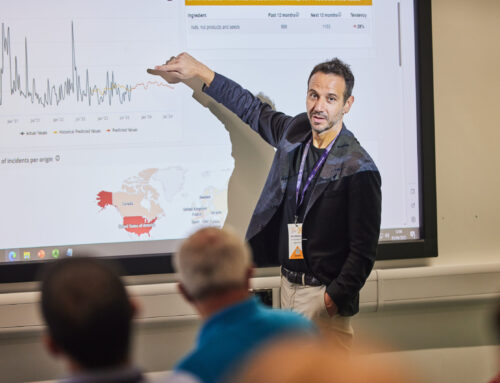
Let me introduce you to a fellow Canadian and former Culinary Ambassador to Russia. This is Paul Damaren, Senior Vice President Food Safety & Supply Chain at Perry Johnson Registrars Food Safety, Inc. (PJRFSI).
Paul is working for an organization that is quite different to the tech companies and food manufacturers that have been represented in my digital transformation interviews so far. PJRFSI is a global Certification Body who serves clients through effective risk management strategies and implementation of global standards. They help organizations achieve continuous improvement within their supplier management, product approval management and internal compliance processes.
When I reached out to Paul, what I was seeking to understand was the impact of COVID-19 to the certification industry. He is not only a professional with more than 17 years in the food and certification industry, but was also a Chef and consultant for 20 years. Working in major hotel chains and restaurants, so he knows very well the food service business demands.

(Photo by Max Delsid on Unsplash)
Paul, many people think that COVID-19 accelerates the digital transformation of the food supply chain. We see that our clients ask for more digital tools that will help them perform tasks remotely – even from home. What is your opinion?
I believe the statement above to be 100% correct.
Since the start of the global pandemic in late February 2020, the effects of the COVID-19 virus (aka Coronavirus) has been felt around the world. COVID has fast-tracked the transformation of our industry!
There have been and continue to be several countries around the world including USA & Canada that have issued mandates pertaining to permitted gatherings of people, and official “STAY AT HOME” orders to flatten the global curve of the virus. Unemployment rates are at an all-time high, resulting in a shortage of workers globally and thus creating new challenges to the already globalized food industry and the supply of food as well.
COVID-19 has necessitated Certification Bodies, including Perry Johnson Registrars Food Safety Inc., to accelerate the use of digital and remote auditing techniques, and the use of virtual technology has transformed the way we do business today, i.e. “digital transformation”. COVID-19 has absolutely accelerated the digital transformation of the food supply chain.
Which changes do you see coming in the market?
Our business as we knew it has changed dramatically in the last 11 months. Virtual workforces and remote auditing are now the “new normal” and countless organizations have large numbers of employees with Regional, National & Global locations or based remotely, often spanning geographic borders. Some organizations have moved to a fully remote environment “forever”. Given the current global climate, we see that virtual audits are becoming more effective and efficient when technology such as phone and video conferencing, webcams, smartphones and other smart technology are utilized.
Remote audits have come to stay; their advantages are unquestionable over the traditional methods, although there are still some barriers to overcome. Traditional audits, even when they have been well planned and executed, may cause a certain amount of inconvenience and disruptions to the organization being audited. In addition, business managers are increasingly finding these e-audits very attractive, since reductions in costs and resources are undeniable using virtual methodologies.

What do you hear from your clients?
Our clients are subjected to strict global government guidelines and practices, ensuring every product they make meets and even exceeds industry standards. Our clients today are faced with increasing consumer demands and expectations, significant regulatory control, intense competitive pressure as well as an expanding need for governance, brand differentiation and risk management.
Many of our clients have contacted us indicating a variety of situations that have impacted their ability to host a successful audit including operations reduced or completely down; a “no visitor” policy and restrictions on access to certain locations while others are still accessible for audit assessment.
We are seeing peoples’ preferences change rapidly. Health-conscious attitudes have always been prevalent in recent years but are more noticeable today than ever. For many clients, this has meant shifting from B2B to a direct-to-consumer model and the use of virtual services for their meetings, conferences and events. This new progression of our digital world has opened many businesses and “peoples” eyes to a new way of doing business.
People are spending more time at home, cooking their own meals and the demand for healthy fresh food that can easily be traced back to its origins is an expectation of today’s consumer and buyers.
Which needs are they highlighting during this period?
Our clients are looking for us to provide more options to them to ensure they can keep their doors open and meet the needs of their customers, i.e. Certification.
I see many new trends headed our way that include customized nutrition programs, digital technology across the entire food supply chain, and an integration of common standards in the industry with Food Safety standards, e.g. Responsible Waste and the Global Food Safety Initiative (GFSI) recognised standards, such as SQFI, BRCGS, or FSSC as an example.
Due to our clients needs, our goal is providing greater transparency, cost effectiveness, improved risk management and enhanced brand protection.
How do you respond to these needs?
I believe it is paramount that we listen to our clients and hear what is important to them to operate their business and to protect their staff and their families.
It is also critical that our clients know they can reach out to us anytime and will get a live person on the other end of the phone, not a recording. We all need to be empathetic to the challenges they must face and ensure we not only meet their needs but anticipate them and focus on them. That is truly what is important.
Over the past 11 months we have fielded countless inquiries from our clients about the policies we have put in place to protect the safety of our employees and equally important, theirs. It is paramount to continue reviewing valuable public health information from the Centers for Disease Control and Prevention and other bodies such as the World Health Organization daily to provide our clients with the most up to date information on the market.
Let’s face it, the landscape of our industry is a constantly changing, dynamic place where trends can shift, and client expectations change in an instant. From recalls to regulation, navigating that landscape can be a challenge for organizations of all scopes and sizes. To truly respond to your client’s needs, step a mile in their shoe. Understand where their risk is and provide solutions that make sense for their business.
What is your company doing differently to serve your clients better?
There have been countless actions that we as a company have taken to serve our clients during the pandemic. First and foremost, to serve and focus on our clients we needed to stabilize our global business and operations and our employees so that we could continue to support our clients.
On top of the basics like staying home if you are sick, sanitizing everything from our cars, our laptops, our hands and mobile devices to developing clear corporate policies for all employees, we are doing everything in our power to ensure our employees are sticking to the strict preventive policies and procedures that we have put in place to protect our clients.
We have also required that all auditors who work for PJRFSI are self-monitoring for COVID-19 symptoms daily and self-isolate if they believe they have come into contact with anyone that may have been infected or presumed to have a case of COVID-19.
In February 2020, we began to take the necessary steps to mitigate the risks of auditing during the pandemic while keeping our customers’ certificates current by cautious onsite audits and use of virtual technology. Many of the global audit schemes put restrictions in place around onsite auditing that reduced our ability as a Certification Body to conduct onsite assessments.
Most scheme owners in the industry followed the guidance as laid out in the Informative Document (ID) 3 entitled: “Management of Extraordinary Event or Circumstances Affecting ABs, CABs, and Certified Organizations.” IAF ID 3:2011 Informative Document for Management of Extraordinary Events or Circumstances Affecting ABs, CABs and Certified Organizations. This allowed companies to extend their Food Safety certificates by six months. So, because of this, we had to adapt as a company and ensure our global audit force was prepared and trained to work in the “new normal”.
In response to the new operational needs created by the risk of pandemics, we created the “Returning to Work Game Plan”. The full “Game Plan” includes a brief overview document, a comprehensive guide document, as well as a Virtual Self-Assessment Tool. These documents and tools are meant to provide practical recommendations for operational changes, based on guidelines from the Centers for Disease Control and Prevention and World Health Organization, that could be tailored by organizations to address various scenarios they may face when returning to work.
Also, between April – December 2020, our goal at Perry Johnson Registrars Food Safety, Inc. was to provide our customers with complimentary training and thought leadership from experts in the industry, and to support our customers while helping to mitigate the risk in their business. We conducted 27 complimentary webinars during a 6 month timeline, to over 6,000 attendees and partnered with industry experts to accomplish this.
In your opinion, what is the digital technology that will be more extensively adopted by the market during the next 12 months?
Companies are quickly shifting to adopt digital strategies to compete in today’s marketplace. Companies like Zoom, Microsoft (with Teams), Houseparty, or Cisco (with Webex) have thrived during the pandemic. As a Certification Body, it is critical that we consider all digital options, food technology and various infrastructures that are present in today’s market. We need to adopt or grow these options to meet the needs of our clients and that of their supply chain.
We are only at the beginning, we all need to start building our plans for recovery post COVID-19, which includes a pivot to our business models, our operations, our supplier policies (maybe even off-boarding strategies), our technologies and re-mobilizing our work force.
This is a time of monumental change and now is the time for us all to execute and lay out our plans to give not only our clients or suppliers but our stakeholders and employees confidence that we are in control.




